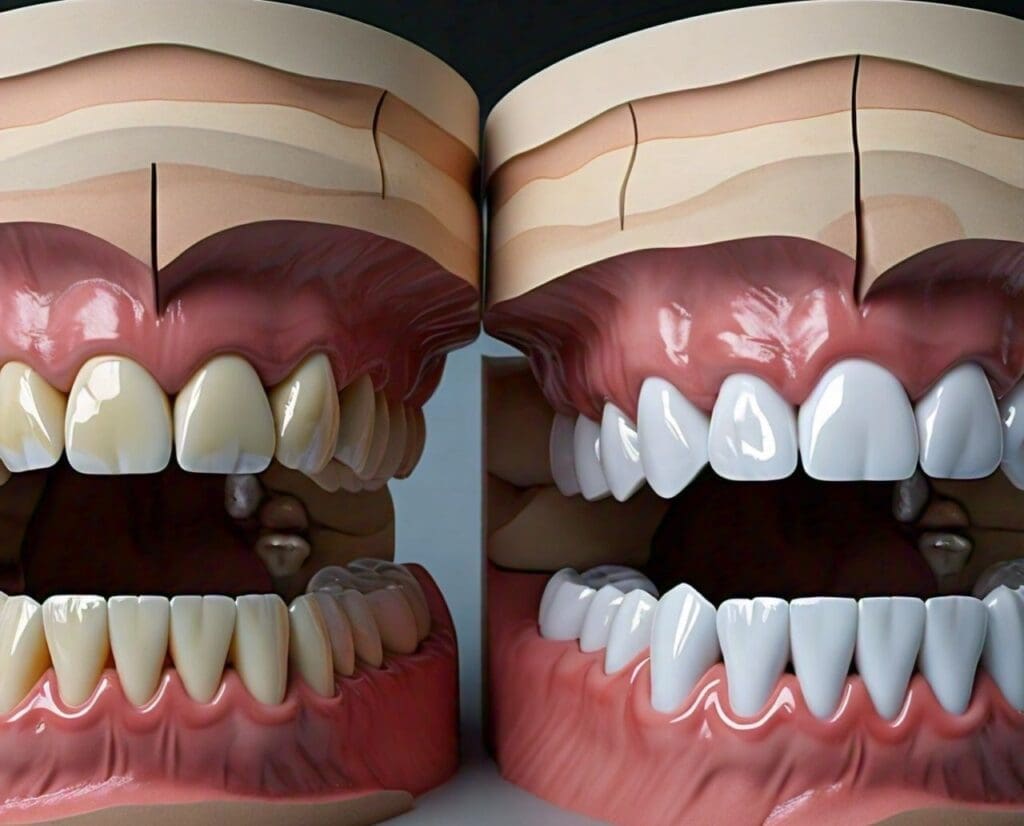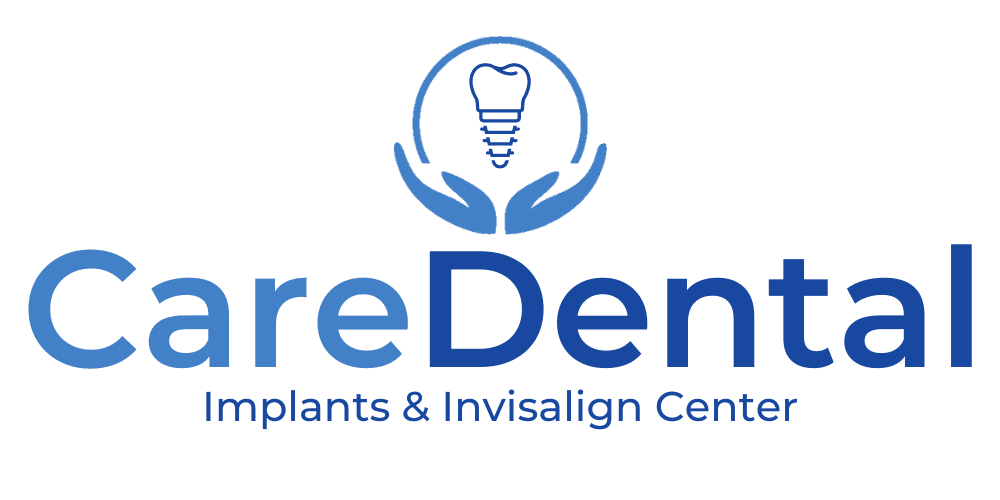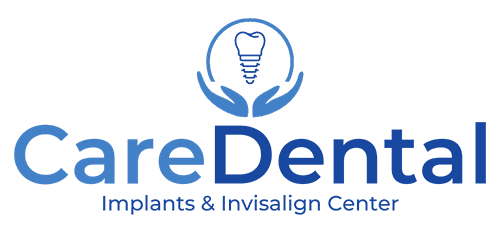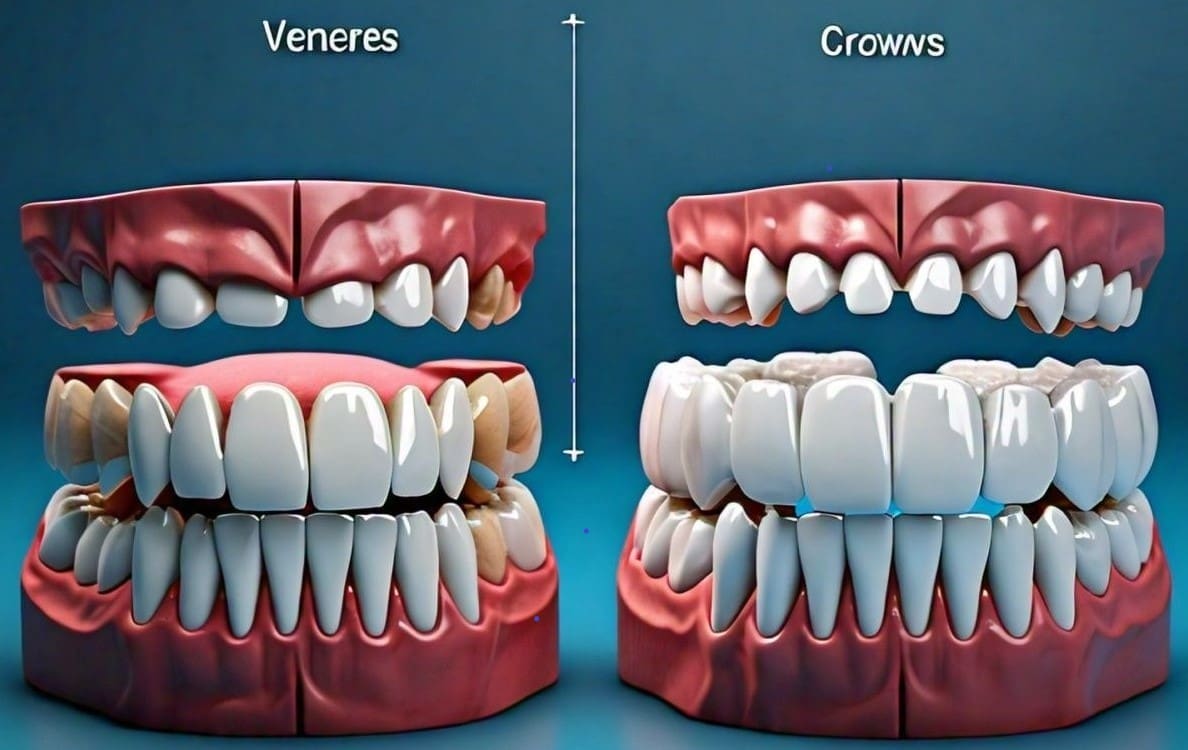In the world of cosmetic dentistry, making a decision between veneers and crowns can be crucial for anyone looking to enhance the appearance and function of their teeth. Both options offer transformative results, but understanding the difference between veneers and crowns, including porcelain veneers, composite veneers, dental crowns, and tooth crowns is essential. This choice significantly impacts everything from the procedure details, such as crown procedure and veneer application, to the materials used like zirconia crowns and porcelain crowns.

The forthcoming analysis will delve into the nuances of veneers versus crowns, examining aspects like implant crowns, the cost differences in crown vs veneer, and the suitability of crown vs veneer for front teeth. By comparing dental veneers and dental crowns side by side, this article aims to provide a comprehensive guide to help readers make an informed dental decision. The focus will be on presenting the facts clearly and concisely, following easy-to-understand language and structure to enhance readability while seamlessly integrating primary and secondary keywords for SEO optimization.
Understanding Dental Veneers
Dental veneers are a popular cosmetic solution designed to enhance the appearance of your smile. These thin shells, typically made from porcelain or composite materials, are bonded to the front surface of the teeth. Veneers are primarily used to address aesthetic concerns such as discoloration, minor misalignments, chips, or gaps between teeth. The process for applying veneers involves minimal preparation of the natural tooth, preserving most of the original structure.
Key Characteristics of Dental Veneers
- Material Composition: Veneers are crafted from either high-quality porcelain or composite resin. Porcelain veneers are favored for their durability and resistance to stains, closely mimicking the light-reflecting properties of natural teeth. Composite veneers offer a more economical option and can be applied in a single visit.
- Application Process: The procedure begins with the removal of a small amount of enamel to accommodate the veneer. An impression of the tooth is then made, from which the custom veneer is crafted. Once ready, the veneer is permanently bonded to the tooth using a special adhesive.
- Aesthetic Benefits: Veneers are an effective solution for enhancing tooth color, shape, and overall smile appearance. They are custom-made to fit the individual’s teeth, providing a natural look that can dramatically improve one’s confidence and self-esteem.
Practical Considerations
- Durability: Porcelain veneers typically last between 10 to 15 years, while composite veneers may need replacement sooner.
- Care Requirements: Like natural teeth, veneers require regular brushing and flossing. It’s recommended to avoid overly hard foods and to use non-abrasive toothpaste to prevent damage.
- Cost and Maintenance: The cost of veneers varies depending on the material and the number of teeth being treated. Regular dental visits are crucial to ensure the longevity of the veneers and to maintain oral health.
Veneers offer a less invasive alternative to crowns and can significantly improve the aesthetics of your teeth with minimal discomfort. They are especially suitable for individuals looking to make slight modifications to their smile rather than undergoing more extensive dental procedures.
Exploring Dental Crowns
Dental crowns, often referred to as caps, play a pivotal role in dental restoration by encasing a tooth or dental implant. They are custom-made to fit over the entire tooth, starting at the gum line, and are typically used when a tooth is significantly damaged or decayed. Here, we explore the various facets of dental crowns to understand their function, application, and care.
Types and Materials
- Materials Used: Crowns are made from a variety of materials including metals, porcelain fused to metal, all-resin, all-ceramic, or all-porcelain. Each material has its benefits, such as durability in metal crowns and a natural appearance in porcelain crowns.
- Choosing the Right Material: The choice of material often depends on the tooth’s location, the amount of natural tooth left, and personal aesthetic preferences.
Application Process
- Initial Visit: During the first appointment, the tooth is reshaped to prepare for the crown and an impression is made. This impression is then sent to a dental lab to fabricate the crown.
- Temporary Solution: A temporary crown is placed to protect the tooth while the permanent crown is being made.
- Final Placement: On the second visit, the permanent crown is adjusted for fit and color, then cemented into place.
Maintenance and Considerations
- Longevity and Care: Crowns are durable and can last anywhere from 5 to 15 years or longer, depending on the material and adherence to good oral hygiene practices.
- Potential Issues: While crowns are a robust solution, they can sometimes break or the tooth underneath may decay if not properly maintained. Regular dental visits are crucial for ensuring the health of a crowned tooth.
By understanding these key aspects, individuals can make informed decisions about whether dental crowns are the right solution for their dental health needs.
Comparative Analysis: Veneers vs. Crowns
Process and Visits
- Number of Dental Visits:
- Veneers: Typically requires three visits to the dentist – one for a consultation and two for the actual application.
- Crowns: Generally involves two visits – the first for tooth preparation and impression, the second for crown placement.
Aesthetics and Durability
- Aesthetic Appeal:
- Veneers: Known for their superior aesthetic quality, veneers maintain their brightness for a longer period without staining.
- Crowns: While also aesthetic, crowns may not match the veneer’s ability to mimic the translucence of natural teeth.
- Durability:
- Veneers: Less durable than crowns, often needing replacement after 5-10 years.
- Crowns: More robust, potentially lasting 15 years or more with proper care.
Cost and Insurance
- Expense:
- Veneers: Cost ranges from $925 to $2,500 per tooth.
- Crowns: Generally more expensive, costing between $1,000 and $3,500 per tooth.
- Insurance Coverage:
- Veneers: Rarely covered by dental insurance as they are considered cosmetic.
- Crowns: Often partially covered by insurance, especially when deemed medically necessary.
Pros and Cons of Veneers
Advantages of Veneers
- Aesthetic Enhancement: Veneers offer a significant improvement in the appearance of teeth, effectively addressing issues like chips, severe discoloration, or minor misalignments. They are particularly beneficial for teeth that cannot be whitened traditionally.
- Customization: Each veneer is tailor-made to fit the individual’s dental structure and aesthetic preferences, ensuring a natural look that complements overall facial symmetry.
- Durability and Maintenance: Porcelain veneers are robust, resistant to stains, and can last up to 15-20 years with proper care. They mimic the light-reflecting properties of natural teeth and require the same maintenance as natural teeth, including regular brushing and dental check-ups.
- Minimally Invasive Procedure: The application of veneers can often be completed in just two visits and usually involves minimal tooth structure removal, making it a less invasive option compared to other dental procedures.
Disadvantages of Veneers
- Irreversibility: Once applied, veneers require the removal of a small amount of tooth enamel, which makes the procedure irreversible. This permanent alteration necessitates careful consideration before proceeding.
- Cost: Veneers are often a costly investment, especially since they are considered a cosmetic enhancement and are typically not covered by dental insurance.
- Potential for Damage: While durable, veneers are not indestructible. They can chip or crack under pressure, and unlike natural teeth, they cannot be whitened if stained from the inside. Matching the color of natural teeth with veneers can also be challenging and may require a full set for uniformity.
- Sensitivity: Some patients may experience increased sensitivity to hot or cold temperatures following the veneer application, due to the enamel removal. This sensitivity generally subsides but can be uncomfortable in the interim.
Considerations for Optimal Outcomes
- Proper Planning: Ensuring detailed planning and precise execution during the veneer application is crucial to avoid issues like misalignment or improper bonding, which can lead to veneers popping off.
- Lifestyle Adjustments: Patients should avoid habits that could compromise the integrity of veneers, such as biting nails or chewing on hard objects.
- Professional Guidance: Consulting with a dental professional who specializes in cosmetic dentistry is recommended to discuss the viability of veneers based on individual dental health and aesthetic goals.
Pros and Cons of Crowns
Advantages of Dental Crowns
- Protection and Strength: Crowns safeguard weakened or damaged teeth, reinforcing them and preventing further damage. They are especially beneficial for teeth at risk of breaking or chipping.
- Durability: With proper care, dental crowns are extremely durable, lasting anywhere from 5 to 20 years. This longevity makes them a cost-effective option in the long run.
- Functional Improvement: Crowns improve chewing and speaking functions by restoring the shape and stability of the tooth.
- Aesthetic Improvement: They enhance the appearance of teeth by correcting shape and color, and can dramatically improve one’s smile.
Disadvantages of Dental Crowns
- Irreversible Procedure: The process involves the removal of a significant portion of the original tooth enamel, making it a permanent solution that always requires the tooth to be protected by a crown.
- Potential for Sensitivity and Discomfort: Patients may experience sensitivity to temperature or discomfort, especially if the crown is improperly fitted. Additionally, there can be pain when biting down if the crown is too high.
- Risk of Damage: While crowns are durable, they can chip or break, particularly porcelain crowns. If the dental cement washes away, the crown may become loose or fall off.
- Allergic Reactions: Though rare, some individuals may have allergic reactions to the materials used in crowns, such as certain metals or porcelain.
Considerations for Long-Term Success
- Regular Dental Check-Ups: Frequent visits to the dentist are crucial to ensure the crown remains in good condition and to address any issues promptly.
- Proper Oral Hygiene: Maintaining excellent oral hygiene helps prolong the life of the crown and supports overall dental health.
- Avoiding Hard Foods: To prevent damage, it’s advisable to avoid chewing hard foods with the crowned teeth.
Conclusion and Recommendations
Deciding between veneers and crowns is a key step for anyone looking to improve their dental health and aesthetics. This choice determines the kind of care, maintenance, and potential future treatments an individual may need. Veneers enhance appearance with minimal invasiveness, focusing on cosmetic improvement. Crowns restore damaged teeth for both function and aesthetics. Consider personal needs and goals when choosing between these options.
The decision-making process should consider the long-term implications of either choice, such as durability, care requirements, and the potential need for replacement. Consulting with a dental professional provides valuable guidance tailored to individual cases, ensuring the selected treatment aligns with the desired outcome. Ultimately, the choice between veneers and crowns should support not only the immediate aesthetic or structural needs but also contribute positively to overall oral health.


